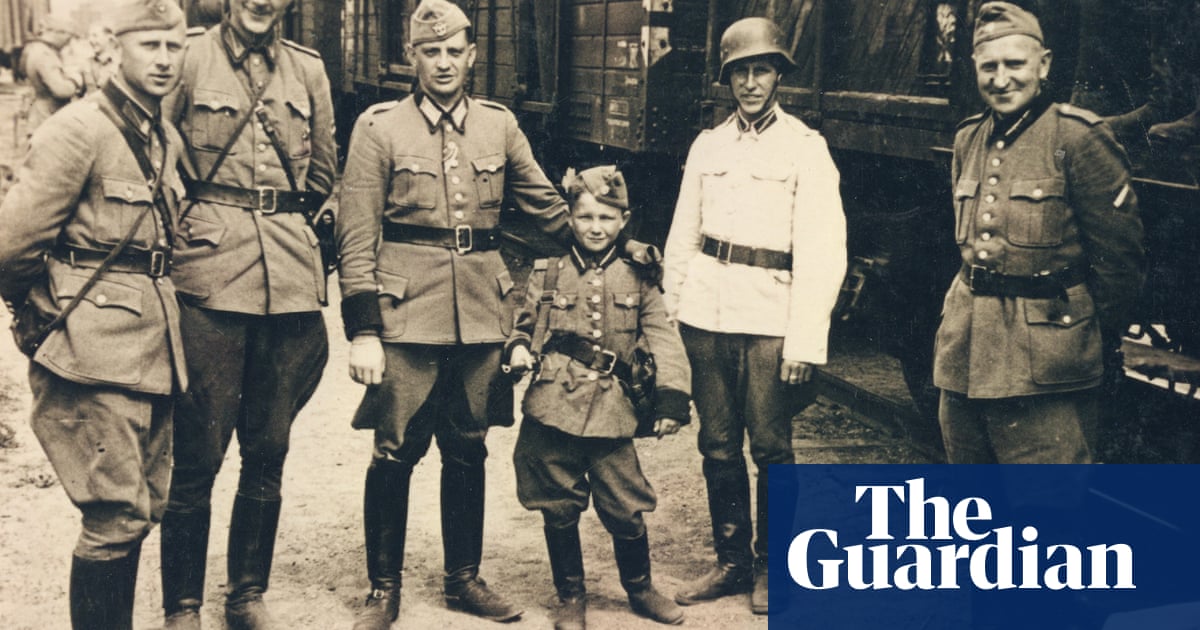
n early 2011, something strange happened. A sitcom centred on the weekly gatherings of the Goodman family debuted on Channel 4, jam-packed with intricate slapstick, infantile pranking and idiosyncratic terms of endearment (“Hello bambinos!”). But it wasn’t merely Friday Night Dinner’s comic language that made it an unexpected joy. Incredibly, the show was the second sitcom about a British Jewish family to arrive on UK screens in the space of six months, after Simon Amstell’s Grandma’s House. Honestly, you wait a lifetime for a show about British Jews and two come along at once.
Yet while Grandma’s House – the bleaker and more awkward of the two – bowed out after two series, Friday Night Dinner kept going. To date, it has had six series and 37 episodes, charming audiences with a chaotic mix of brotherly, practical-joke-based warfare, motherly mollycoddling, stomach-churning condiment consumption (dad Martin) and terrifying social ineptitude (neighbour Jim). This Friday, it celebrates its 10th anniversary with a documentary in which cast members including Tamsin Greig, Paul Ritter, Simon Bird and Tom Rosenthal, plus famous fans, relive the scrapes and squirrel quips that made Friday Night Dinner one of the most treasured comedies in recent memory – and the longest-running Channel 4 sitcom since Peep Show.
Friday Night Dinner’s popularity only grew with time – viewing figures doubled for its sixth series, in 2020 – so the announcement this week that there will be no more episodes was a blow for millions of fans. But, for most of them, it won’t have been a surprise.
Between news of the documentary and its eventual screening, the show made headlines for a different, terribly sad, reason. In April, Ritter, who played the patriarch, Martin, died of a brain tumour. To call Ritter a revelation in the role would be an understatement; he refers to it as a “gift” in the documentary, which he filmed while he was ill (his on-screen wife, Greig, says she tried to convince him not to participate, but Ritter insisted).
Previously best known for his theatre work and parts in BBC dramas, Ritter brought that rigour to Martin, ensuring he was both sublimely eccentric and entirely plausible – equal parts stubborn and oblivious to social norms (such as not spending 80% of your time topless) and satisfyingly off-kilter in his reactions to absolutely everything. He made Martin a character who could power farce, but also fit into a contemporary comedy landscape that requires a significant level of realism: his line in dad vernacular (“Shit on it!”) was welcome in both worlds.
That ability to balance idiosyncrasy with mass appeal (catchphrases, in this day and age) is what makes Friday Night Dinner such a remarkable achievement. The charm is in its peculiarity – and it uses that oddness to extract comedy that is irresistibly, viscerally funny, rather than cultish. Friday Night Dinner’s aim is to elicit laughter that has you prostrate on the living room floor, something it achieved (for me, anyway) with its very first episode, which brings together a badly manoeuvred sofabed, a grieving stranger, a cup of salty tea and a glass of salty water (“My father’s just died and you’re just putting salt in everything!”). That Friday Night Dinner can make a sitcom trope as hackneyed as a stuck sofa feel surprising is testament to its sophistication. You could compare it to Arrested Development for its mastery of modern visual farce.
The secret behind that union of quirkiness and mainstream entertainment is Robert Popper, who based the Goodmans on his own family. A former comedy commissioner at Channel 4, he has long peddled a downright bizarre comic seam, from writing and starring in the 00s Tomorrow’s World spoof Look Around You to his Timewaster Letters books, in which his alter ego Robin Cooper baffles organisations across Britain. At the same time, he has been a key part of several comedy phenomena, acting as script editor on The IT Crowd, The Inbetweeners (in which Bird made his name) and Peep Show.
Popper is also Jewish; the show’s premise revolves around the family coming together for a Shabbat meal (“Shalom, Jackie!”). Growing up in the 00s, I watched blockbuster US sitcoms such as Friends, Seinfeld and Will & Grace reference Jewishness constantly with a mixture of glee and envy. Although I am only Jewish-ish (my dad is), knowing not an unrelated soul who celebrated Passover or knew what matzah was meant that mentions of such things on TV felt thrilling and surreal: it simply never happened on British TV.
Friday Night Dinner changed that, with a primetime sitcom that wasn’t about being Jewish, but rather featured characters that happened to be Jewish. It doesn’t include many religious references, although there is a fair amount of lingo, and it would be hard to argue that it cleaves to the classic tropes of Jewish humour (yes, the matriarch, Jackie, smothers her adult sons, but isn’t that just mums?). Yet the specificity of the setting makes it feel more distinctive and thus more relatable – everyone has a cultural background, and there is nothing harder to identify with than “universal” lives characterised by watered-down averageness.
That specificity is especially important for a family sitcom – particularly one that cherishes the intimacy of the home, marking it as a place where people can really be themselves, with outsiders generally treated as irritants (to be fair, in Friday Night Dinner, most of them are). Unlike the sons, Jonny and Adam, not everyone is able to return to their childhood home and regress accordingly. But that feeling of barriers-down relaxation that comes with being with your immediate family is something Friday Night Dinner captures brilliantly. The shared shorthand, the soporific nature of the sofa, the palpable irritation – and the freedom to express that irritation: it is a kind of cabin fever that brings out people’s unfiltered characters. It is a petri dish for sitcom gold.
There is no doubt that Friday Night Dinner has had an impressive innings. As the documentary acknowledges, long-running British sitcoms are few and far between. Until recently, it seemed there was no end in sight for the show: in 2020, just as the last series was about to air, Popper told the Radio Times he had no plans to stop. However, the awful news of Ritter’s death made another series seem incredibly unlikely and now Popper has confirmed it, citing a reluctance to incorporate children into the show’s situation (the last episode ended with both brothers expecting babies). The Goodmans will be missed by millions, but all good things must come to an end – and Friday Night Dinner was a really good thing.












